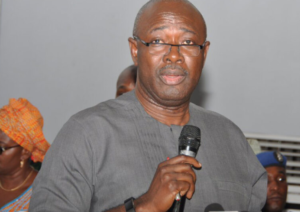NNPC Must Increase Fuel Price Above Landing Cost to Curb Smuggling, Says Heineken Lokpobiri
NNPC Must Increase Fuel Price Above Landing Cost to Curb Smuggling, Says Heineken Lokpobiri

Heineken Lokpobiri
Senator Heineken Lokpobiri, Nigeria’s Minister of State for Petroleum (Oil), has asserted that the Nigerian National Petroleum Corporation (NNPC) Limited must sell imported fuel at a price higher than the landing cost to effectively combat smuggling.
Speaking at the 2024 Energy and Labour Summit in Abuja, Lokpobiri also criticized security agencies for their role in enabling smuggling operations. He argued that as long as NNPC sells fuel below its landing cost, smuggling will persist.
“If NNPC imports PMS and sells it to marketers at around N600 or less, smuggling will continue unabated,” he stated. “Even if you deploy all the police officers to monitor the roads, they are Nigerians too, and their response will be predictable.”
Lokpobiri acknowledged that while smuggling from Nigeria to neighboring countries remains a significant issue, it cannot be completely eradicated. He also pointed out that NNPC struggles with outdated and corroded pipelines, some dating back to the 1960s and 1970s, which are vulnerable to vandalism and theft. “The pipelines are so dilapidated that they are easy targets for tampering,” he explained. “The main issue is transporting the fuel due to the poor condition of these pipelines.”
To address these challenges, Lokpobiri suggested exploring public-private partnerships to improve infrastructure. “We need to adopt a global model—PPP—bringing the private sector into the solution,” he added.
Additional Context
Nigeria has faced difficulties in meeting its oil production targets for the year. Initially aiming for 1.78 million barrels per day, the Organization of Petroleum Exporting Countries and its allies (OPEC+) set a lower production quota of 1.5 million barrels per day in December, falling short of the budget target by 288,000 barrels.
In January, Nigeria’s crude oil production averaged 1.42 million barrels per day, missing both the OPEC quota and the budget goal. This figure further declined to 1.32 million barrels per day in February and to 1.23 million barrels per day in subsequent reports. Throughout the first quarter, Nigeria continued to struggle with production targets, averaging just 1.4 million barrels per day.
TRENDING SONGS
 Trending Video: Muslim Man Joins Wife in Hallelujah Challenge ‘Dress Like Your Miracle’ Night
Trending Video: Muslim Man Joins Wife in Hallelujah Challenge ‘Dress Like Your Miracle’ Night
 Woman Seeks Advice as Late Brother’s Wife Refuses to Mourn Him Following His Death With Alleged Mistress
Woman Seeks Advice as Late Brother’s Wife Refuses to Mourn Him Following His Death With Alleged Mistress
 Nobody Cares About Fine Girls In The UK, I Miss Nigeria — Nigerian Lady Laments
Nobody Cares About Fine Girls In The UK, I Miss Nigeria — Nigerian Lady Laments
 Wedding Called Off: How Lady Cancels Wedding After Finding Out Finance’s Affairs With Her Bestie
Wedding Called Off: How Lady Cancels Wedding After Finding Out Finance’s Affairs With Her Bestie
 Heartbreak in Ikeja: Lady Weeps After Fufu Found in New Phone Package
Heartbreak in Ikeja: Lady Weeps After Fufu Found in New Phone Package
 Twist of Fate: Man Who Questioned Phyna’s ₦1Billion Demand Mourns Brother in Dangote Truck Crash
Twist of Fate: Man Who Questioned Phyna’s ₦1Billion Demand Mourns Brother in Dangote Truck Crash
 Tragedy in Enugu: Dangote Truck Claims Lives of Family of Five
Tragedy in Enugu: Dangote Truck Claims Lives of Family of Five
 Bangkok Crackdown: Nigerian-Thai Couple in Police Net Over Drug Trafficking
Bangkok Crackdown: Nigerian-Thai Couple in Police Net Over Drug Trafficking
 Family Rift: Reno Omokri’s Ex-Wife Says He Deserted Their Special Needs Son
Family Rift: Reno Omokri’s Ex-Wife Says He Deserted Their Special Needs Son
 The Man Who Sent Money for Two Decades, Only to Return to an Empty Shell
The Man Who Sent Money for Two Decades, Only to Return to an Empty Shell
Share this post with your friends on ![]()













